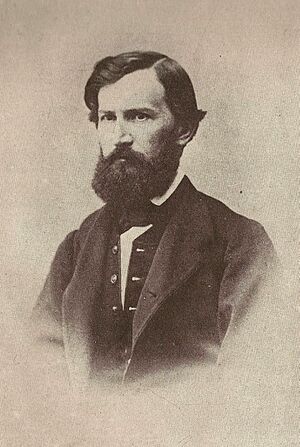Konstantin Ushinsky facts for kids
Konstantin Dmitrievich Ushinsky (Russian: Константи́н Дми́триевич Уши́нский; Ukrainian: Костянти́н Дмитро́вич Уши́нський, romanized: Kostiantyn Dmytrovych Ushynskyi) was a very important Russian teacher and writer. He was born on March 2, 1823, and passed away on January 3, 1871. Many people see him as the person who started modern, scientific ways of teaching in the Russian Empire. He believed in new ideas for schools and how children learn.
Contents
Konstantin Ushinsky's Early Life and Career
Konstantin Ushinsky was born in Tula, a city in Russia. His father was a retired officer. Soon after, his family moved to Novgorod-Siversky. This city is now called Novhorod-Siverskyi and is in Ukraine. There, Konstantin's father became a local judge.
In 1844, Ushinsky finished his studies at Moscow University. He studied law there. From 1846 to 1849, he worked as a professor. He taught at the Demidov Lyceum in Yaroslavl. However, he had to leave this job. This was because his ideas about society and education were considered too modern for the time.
After losing his teaching job, Ushinsky wrote for magazines. He wrote for Sovremennik and Biblioteka dlya Chteniya. This helped him earn money. About a year and a half later, he found a new job. He became a small government worker in a department for foreign religions. Ushinsky later said this job was "the most boring position possible."
Innovations in Education and Teaching
In 1854, Ushinsky started teaching again. He taught Russian Literature and Law at the Gatchina Orphanage. From 1855 to 1859, he became an inspector at the same orphanage. During his time there, something interesting happened. He found two old bookcases that had been sealed for over twenty years. Inside was a library belonging to Hugel, a student of the famous teacher Pestalozzi. This discovery greatly increased Ushinsky's interest in new teaching ideas.
From 1859 to 1862, Ushinsky was an inspector at the Smolny Institute of Noble Maidens. This was a famous school for girls in Saint-Petersburg. He also worked as the chief editor for an important education journal. This journal was called Journal of the Department of Education.
Later, Ushinsky had disagreements with the government's education department. Because of this, he was sent abroad from 1862 to 1867. He traveled to Switzerland, Germany, France, Belgium, and Italy. His task was to study how schools were organized in these countries. Many people thought this trip was a way to remove him from his position.
Ushinsky's Impact on Russian Schools
Towards the end of his life, Ushinsky focused on writing. He also became a public speaker. He worked with Nikolay Ivanovich Pirogov on important changes in Russia. These changes were part of the Emancipation reform of 1861. This reform freed the peasants. After this, many new schools were needed. These schools also needed teachers and textbooks.
Ushinsky strongly believed that all children should go to school. He wanted both boys and girls to have a good education. He also pushed for schools to use the students' native language. He believed in including national traditions in lessons. He was against the government's rules that stopped the use of Ukrainian in schools.
Ushinsky spent a lot of time discussing how to train teachers. He also wrote textbooks to help children learn to read. One of his books was Detski mir (Children's World). This book was very popular, like the McGuffy Reader in America. Another important book was Rodnoe slovo (Our Native Language), published in 1864. This book was used in schools in Ukraine. Before the October Revolution, over 10 million of Ushinsky's books were printed. This included 187 different versions of Rodnoe slovo.
Ushinsky died in Odesa in 1870. He was buried in Kiev.
Key Educational Works
Ushinsky's most important theoretical work was The Human As a Subject of Education: Pedagogical Anthropology. He started writing this three-volume book in 1867. In this work, he explained that education is all about the person learning. He argued that to teach well, you need to understand people. This means using ideas from many subjects. These include philosophy, history, psychology, and even how the body works. Ushinsky famously said, "Teaching without science is like magic in medicine."
One of his big new ideas was the "Analytic-Synthetic Phonetic Method." This was a new way to teach reading and writing. This method is still the main way children learn to read in Russian schools today.
Places Named After Ushinsky
Several educational places are named after Konstantin Ushinsky:
- South Ukrainian National Pedagogical University in Odesa, Ukraine
- Yaroslavl State Pedagogical University in Yaroslavl, Russia
- 1st Simferopol Gymnasium in Simferopol, Crimea, Ukraine
See also
 In Spanish: Konstantín Ushinsky para niños
In Spanish: Konstantín Ushinsky para niños
 | John T. Biggers |
 | Thomas Blackshear |
 | Mark Bradford |
 | Beverly Buchanan |


